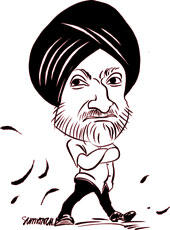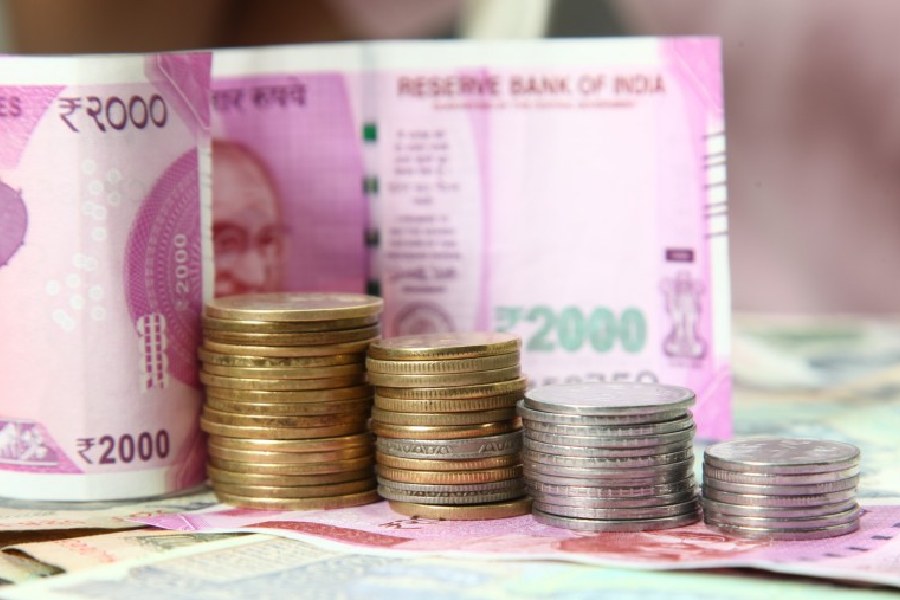|
|
| PART OF THE PLAN |
| Some of the other non-politicos at Yojana Bhavan: Dr. Gadgil (1967-71): Indira Gandhi wanted to save Planning from those Congress leaders who were right-wing and her critics P.N. Haksar (’72-77): Indira’s alter ego, he fell out of favour and was dumped Dr D.T. Lakdawala (’75-77): Brought in when the Emergency regime contemplated discarding centralised planning. |
In the 1980s, when the deputy chairman of the Planning Commission Montek Singh Ahluwalia cut a high public profile for the first time as additional secretary in Rajiv Gandhi?s PMO, the Rhodes Scholar and ace economist got noticed ? beside his intellectual acumen ? for his sartorial distinctiveness too. Ahluwalia folded his turban from left to right, unlike most other Sikhs who?d coil it the other way round. But who?d guess from his headdress that trouble for him could one day brew from the left?
The trouble is indeed real. Between Prime Minister Manmohan Singh and Ahluwalia, regarded as architects of the 1991 reform, which urban Indians hail and communists denounce, the Left has pardoned the former but never quite the latter. When Singh brought him to the Planning Commission after a three-year stint at the IMF, the Left saw him as the new punching bag, though they?d save their punches for the future. ?We?re not very happy about it (Ahluwalia?s appointment),? said CPI leader D. Raja, ??but we are not making a big issue of it?. But Ahluwalia hastened the showdown as he announced the setting up, within the Planning Commission, of 19 consultative groups to review the 10th Five Year Plan (2002-07), with an ?open process of consultation?. That?s the short-hand for bringing consultants from the World Bank and such other multi-lateral bodies, as well as foreign private firms. It was bound to activate the Left?s pugilistic instinct.
Ahluwalia perhaps thought he?d ride out the storm by putting into the consultative group, side by side with the foreign experts, a handful of red academics drawn mostly from the capital?s Jawaharlal Nehru University. But the pro-CPM imports ? crusader couple Prabhat and Utsa Patnaik, and party ideologues Jayati Ghosh and C.P. Chandrashekhar ? were the first to howl at him for allowing the ?foreign hand? to rock the temple of centralised planning on Parliament Street.
The 15 foreign experts at the Yojana Bhavan are more or less a home-grown lot. World Bank?s man J.S. Bajpai was himself a former secretary to the Planning Commission, while Asian Development Bank?s Sudipto Mundle was formerly an economist with Delhi?s National Institute of Public Finance and Policy. Besides, their presence got diluted in the 300-odd members of the consultative groups. But the Left, particularly the CPM, was not impressed. As the date for the party?s scheduled politburo meeting on September 18 approached, a visibly upset Ahluwalia began lobbying behind the high walls of the Marxist party.
It was obviously of little help. For Prakash Karat, influential leader and general-secretary-in-the-waiting, wrote to Ahluwalia soon after the meeting demanding that the foreign experts be dropped. Karat plunged the knife even deeper as he reminded Ahluwalia of the ?widespread feeling since 1991? that agencies like the IMF and World Bank had an ?undue? influence on policy-making in the country. Karat?s letter was an invitation to the leftist academics on the Planning Commission panels to write a downright rude letter to the deputy chairman, and threaten to resign. With the Prime Minister away in the US ? Ahluwalia in tow ? it was Congress president Sonia Gandhi?s turn to save a relationship. She requisitioned the services of finance minister P. Chidambaram who called top Left leaders over for lunch and dinner and plied them with idli, dosa and Chettinad chicken. The dessert that the guests found even heartier was not only the assurance of an ethnic cleansing of Yojana Bhavan but an indication that the UPA may even accommodate, in the Cabinet meeting next week, a part of the Left?s demand to reduce the permissible foreign stake-holding limits for telecom and insurance firms. The Congress thus paid a huge price for Ahluwalia?s eagerness to invite a global audience to the goings-on in an office long regarded as the Indian Left?s ?intellectual Kremlin?.
The deputy chairman was clearly in a hurry. He?d taken representatives of US consultancy McKinsey on board the consultative groups without checking back on past records. In 2001, McKinsey had a sent a team to Delhi with a strong pitch before the then PM A.B. Vajpayee for participating in the planning process. Vajpayee rejected the proposal. Apparently, Ahluwalia ventured to take a Left-supported government where even Vajpayee?s centre-right coalition had feared to tread. He also failed to gauge all the sources of opposition to his move. It wasn?t merely the doctrinaire Left that had thrown a fit. Also enraged were the hundreds of NGOs who see the World Bank and IMF as modern-day demons out to fob off on gullible governments, large dams and costly power projects. They deluged the PMO with protest letters.
The Left?s stand, however rigid, hasn?t been inconsistent with its general belief that the West-led structural reforms have benefitted only a small fraction of India?s populace, but have destroyed jobs and opportunities for millions. It may be a wrong belief, but the Left, with its 62 MPs, is strong enough to force the UPA, with its 217 members, to swallow it without objection. The incident should leave Ahluwalia politically wiser as not a single Congress leader has defended him in public.
In private, some are saying that the Prime Minister might as well have left him undisturbed in his IMF job, and looked for a politician instead. Seldom did his predecessors try that, in fact.











